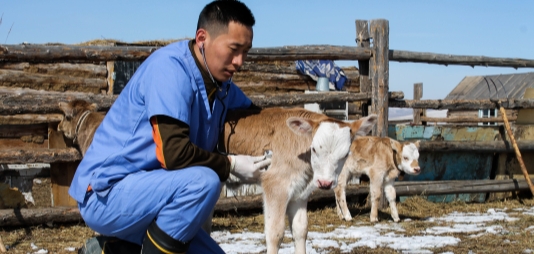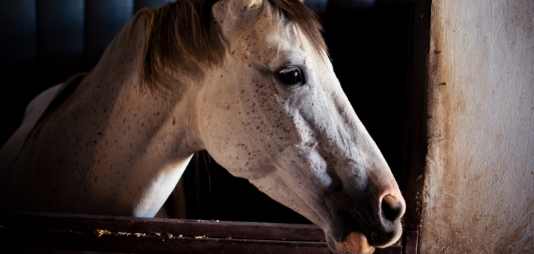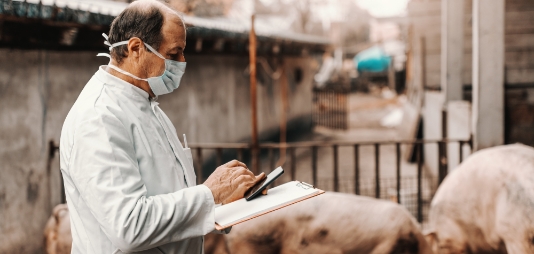ARTICLE
Scaling up
the fight against
antimicrobial resistance
As antimicrobial resistance is making infections harder to treat worldwide, the World Organisation for Animal Health (OIE) has enhanced joint efforts with its partners in 2020 to bolster local action and help fight one of the greatest health challenges of our time.
Addressing antimicrobial resistance, one of the most urgent threats to global health
For years, if a chicken in Indonesia was infected by a dangerous strain of E. coli, farmers could simply treat them with readily available antibiotics. Today, easy solutions like this are no longer possible. 91% of E. coli isolated from Indonesian broiler chickens are now resistant to at least two antibiotics, and more than 50% of isolates are resistant to all antibiotics tested. This problem is not limited to poultry or E. coli bacteria. Resistant micro-organisms (bacteria, viruses, fungi, parasites) can spread between humans, animals, plants and the environment. Furthermore, the drugs used to treat these infectious diseases in animals and humans can be the same. If left unchecked, antimicrobial resistance will continue to endanger global health and food security.
Each year, drug-resistant micro-organisms account for approximately
this figure could reach
A One Health approach to antimicrobial resistance
This is why the OIE, in coordination with partners and as part of its strategy to control antimicrobial resistance (AMR), is scaling up local action through a One Health approach. This approach, championed by the Tripartite Alliance formed in 2010 between the OIE, the Food and Agriculture Organization of the United Nations (FAO) and the World Health Organization (WHO), pools efforts and knowledge from each sector to tackle AMR in humans, animals, plants and the environment.
Investments committed in 2020 through different projects and mechanisms will enable the OIE and its partners to support the development and implementation of One Health National Action Plans on AMR and finance various local actions in several countries.
Stimulating local action
June 2019 marked the launch of the AMR Multi-Partner Trust Fund by the OIE, FAO and WHO. With an initial five-year lifespan, this Fund will strengthen efforts in low- and middle-income countries battling the immediate threats of AMR. An initial investment goal of US$70 million will help provide crucial technical support to participating countries, in addition to providing funding for relevant programmes at regional and global level.
A US$1 million investment secured in 2020 from the Fund for a programme in Indonesia, for instance, will improve awareness and understanding of the risks posed by AMR. Behaviour change will be promoted to optimise the use of antimicrobials in humans and animals. Focus will also centre on strengthening the country’s surveillance and research to produce data on AMR. Thanks to this data, emerging resistance can be detected, and the use of antimicrobials monitored in real-time.
These efforts in Indonesia, as well as those in the other countries that will be supported by the Fund, are expected to lead to improved awareness of AMR, more responsible use of antimicrobials and an overall reduction in infections. AMR is, in part, a naturally occurring phenomenon: over time, bacteria, viruses, parasites and fungi can adapt, making the drugs we use to treat them ineffective. However, our misuse and overuse of antimicrobial drugs is accelerating this natural process. By implementing the OIE Standards on the prudent and responsible use of antimicrobials in animal health, we can slow the emergence of AMR, meaning infectious diseases can still be treated safely and effectively.
Building global governance on antimicrobial resistance
Local efforts will benefit thanks to the advocacy for urgent action by a new global AMR governance mechanism, launched in November 2020. The new One Health Global Leaders Group on AMR will provide political momentum to address this critical worldwide challenge and push for best practices at global, regional, and national levels. It will also strive to shape policy and legislation on the importation, manufacture, distribution and use of antimicrobial drugs across all sectors.
The Tripartite led AMR Multi-Partner Trust Fund supports countries in accelerating efforts to counter the rising threat of AMR through a One Health approach.
Controlling AMR in Latin America
The ongoing efforts to tackle AMR through a One Health approach are also being targeted in Latin America. The “Working together to fight Antimicrobial Resistance” project, funded by the European Union, was kicked off in 2020 by the OIE, FAO and the Pan American Health Organization (PAHO). Thanks to this project, we are supporting the implementation of AMR National Action Plans in seven Latin American countries (Argentina, Brazil, Chile, Colombia, Paraguay, Peru, and Uruguay). The OIE is notably providing expertise to help participating countries address AMR in the veterinary domain, including through the collection and interpretation of quality antimicrobial data and the involvement of the private sector in the control of AMR. Ultimately, this data contributes to the OIE global database on antimicrobials intended for use in animals, which allows us to measure trends over time.
Our actions are also harnessing new technologies for the benefit of all countries: a smartphone app is being created to help identify legally authorised antibiotics, and e-learning modules are being developed for online training of Veterinary Services.
Financial contributions to the AMR Multi-Partner Trust Fund: the Netherlands, Sweden and United Kingdom Government Fleming Fund.


